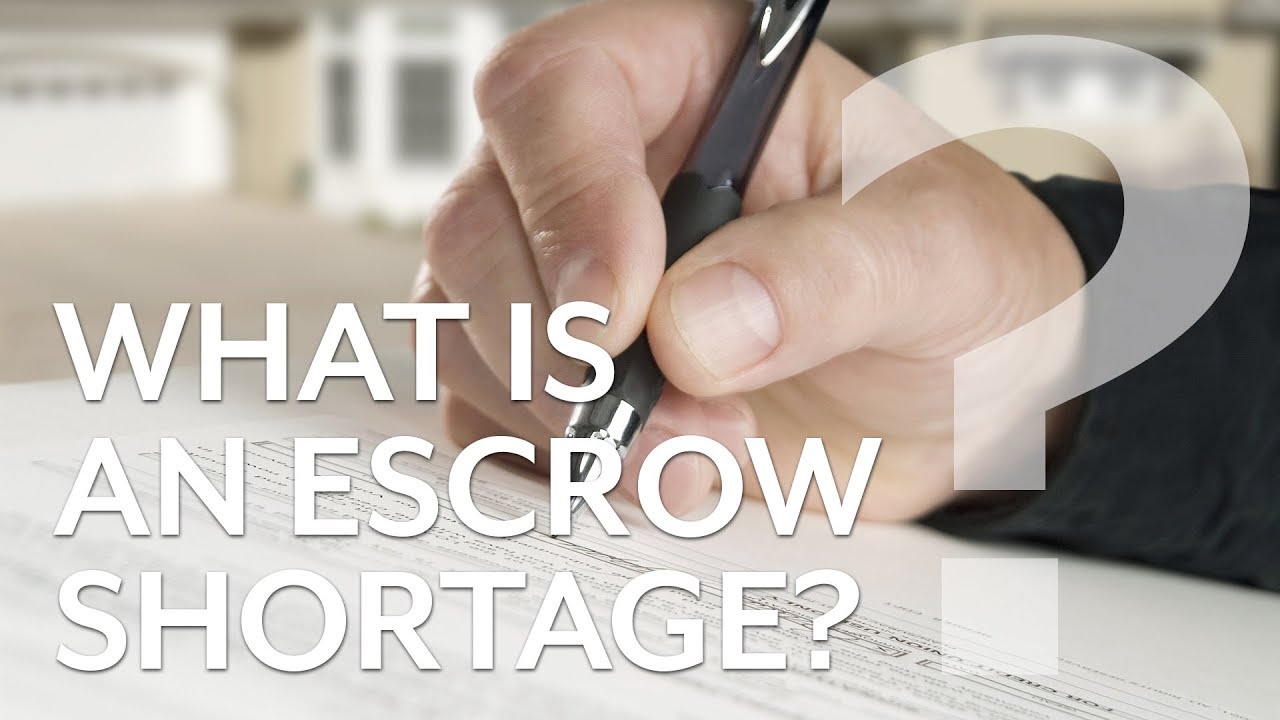An escrow shortage occurs when there are insufficient funds in the escrow account to cover the required expenses. Escrow shortage can result from property tax increases, changes in insurance premiums, or miscalculations in the initial escrow payment.
In these cases, the homeowner may have to pay a lump sum to cover the shortage or have their monthly escrow payment adjusted. Understanding the causes and potential solutions for escrow shortages is essential for homeowners to manage their finances effectively and avoid financial hardships.
We will explore the common reasons for escrow shortages and provide guidance on how to handle them.
Table of Contents
Understanding Escrow Shortages
Escrow shortages occur when there is an insufficient amount of funds in an escrow account to cover expenses such as property taxes and insurance. These shortages can arise due to various reasons, including an increase in tax rates or insurance premium costs.
Homeowners can be affected by escrow shortages as they may have to pay additional funds to cover the shortfall. It is important for homeowners to understand the definition and explanation of escrow shortages to avoid any surprises or financial burden.
By being aware of common reasons for escrow shortages, such as changes in tax assessments or underestimation of insurance costs, homeowners can better plan and budget for potential shortages. Taking proactive measures, such as reviewing escrow statements regularly and communicating with lenders, can help homeowners manage the impact of escrow shortages on their finances.
Identifying Escrow Shortages
Escrow shortages can be a cause for concern when managing finances. It’s important to be able to identify the signs of a potential shortage. One way to do this is by calculating and analyzing escrow account balances regularly. By keeping track of these balances, you can stay on top of any discrepancies that may indicate a shortage.
Additionally, there are warning signs that can help you anticipate an impending shortage. These may include unexpected increases in property taxes or insurance premiums, or even a sudden rise in the homeowner’s mortgage payment. Being aware of these indicators can help you take proactive measures to prevent or address an escrow shortage before it becomes a larger issue.
Stay vigilant and keep a close eye on your escrow accounts to ensure financial stability.
Managing Escrow Shortages
A shortage in escrow can cause financial stress for homeowners. To manage this situation effectively, it is important to communicate with your mortgage servicer or lender. Reach out to them to discuss the shortage and understand the reasons behind it.
Requesting an escrow analysis or audit can provide you with a detailed breakdown of your escrow account and help you identify any discrepancies. By taking these steps, you can gain a better understanding of your escrow shortage and work towards resolving the issue.
It is crucial to stay proactive and engaged throughout the process to ensure a smooth resolution.

Credit: nfmlending.com
Addressing The Root Causes
Escrow shortages can be addressed by identifying and adjusting the factors contributing to them. One crucial step is reassessing property tax assessments and insurance premiums to ensure they accurately reflect the property’s value and risk profile. By doing so, homeowners can prevent unexpected spikes in escrow payments.
Additionally, exploring options for reducing escrow payments can be beneficial. This might involve renegotiating insurance premiums or seeking lower property tax rates. By proactively addressing the root causes of escrow shortages, homeowners can better manage their finances and avoid financial stress.
It is important to regularly review and take action on these factors to maintain a stable escrow account and prevent shortages in the future. Through careful assessment and adjustment, homeowners can achieve greater control over their escrow payments and protect their financial well-being.
Avoiding Escrow Shortages In The Future
Escrow shortages can be a frustrating issue for homeowners, but there are strategies to prevent them. Regularly reviewing and updating your escrow accounts is essential in avoiding shortages. It allows you to stay on top of your property tax and insurance payments.
Additionally, effective financial planning can help you manage unexpected expenses that may affect your escrow account. By setting aside funds for potential increases in property taxes or insurance premiums, you can ensure that your escrow account is adequately funded. Taking proactive measures like these will help you avoid future escrow shortages and give you peace of mind knowing that your finances are in order.
Escrow Shortage Resolution Success Stories
Real-life examples of homeowners successfully resolving escrow shortages have provided valuable insights for others. These stories highlight the lessons learned and offer guidance on navigating the escrow shortage resolution process. Homeowners, facing the challenge head-on, discovered effective strategies and shared their experiences to help others avoid common pitfalls.
By understanding how others have tackled escrow shortages, individuals can implement similar approaches to achieve positive outcomes. These success stories emphasize the importance of proactively addressing escrow shortage issues and provide hope for those facing similar situations. Through shared experiences, homeowners gain confidence in overcoming escrow shortfall and finding resolutions that align with their financial goals.
From negotiation tactics to exploring alternative payment options, these stories offer practical and valuable advice for homeowners seeking to resolve escrow shortages.
Escrow Shortage: Frequently Asked Questions
Escrow shortages can be confusing, but we’re here to answer your common questions about them. One important aspect to understand is the resolution timeline for escrow shortages. It varies depending on the specific circumstances and can take some time to be resolved.
To avoid escrow shortages in the future, there are a few tips you can keep in mind. Firstly, review your escrow account regularly to ensure it’s properly funded. Secondly, be aware of changes in your tax or insurance amounts, as they can impact your escrow.
Lastly, consider setting up automatic payments for your property taxes and insurance premiums to avoid any missed payments. By following these tips, you can minimize the chances of facing escrow shortages in the future.
Frequently Asked Questions On Escrow Shortage
What Happens If You Have An Escrow Shortage?
When you have an escrow shortage, you may need to pay more to cover the difference.
Should You Pay Escrow Shortage?
Yes, you should pay the escrow shortage. It is important to keep your escrow account funded properly.
How Do I Avoid An Escrow Shortage?
To avoid an escrow shortage, follow these guidelines: 1. Monitor your escrow account regularly to ensure it has enough funds. 2. Pay attention to changes in property taxes or insurance premiums and adjust your escrow accordingly. 3. Review your annual escrow analysis to identify any potential shortages in advance.
4. Consider setting up a cushion in your escrow account to provide a buffer against shortages.
How Long Does Escrow Shortage Last?
Escrow shortages generally last until the shortfall is repaid, which can vary depending on the specific circumstances.
Conclusion
As we conclude our exploration of the escrow shortage phenomenon, it becomes evident that homeowners need to be well-informed about the implications of this financial conundrum. With lenders lacking sufficient funds to cover property taxes and insurance, homeowners are faced with unexpected financial burdens and potential implications for their homes.
It is crucial for homeowners to closely monitor their escrow accounts and communicate regularly with their lenders to ensure accuracy and avoid any surprises. By understanding the factors that contribute to an escrow shortage, such as changes in property tax rates or insurance premiums, homeowners can take proactive steps to mitigate the likelihood of encountering this issue.
Seeking professional advice from mortgage experts and financial advisors can also offer valuable insights and guidance when navigating the complexities of escrow shortages. Ultimately, staying informed and proactive is key in maintaining a smooth homeownership experience and avoiding any unexpected financial setbacks.
